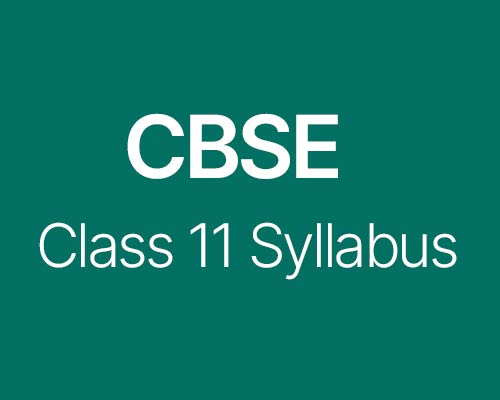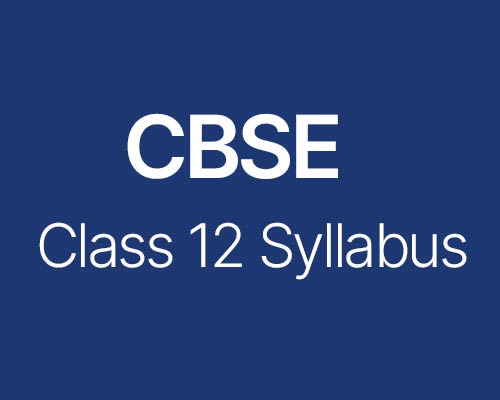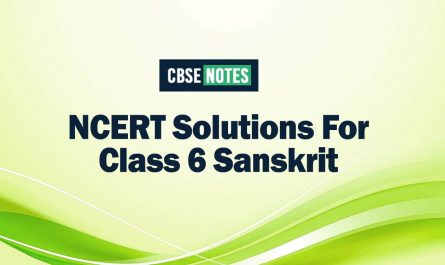The CBSE Syllabus is a set of topics and subtopics that will be taught over the period of an academic year. It contains a synopsis as well as a list of chapters that should be reviewed during the teaching and learning process in a certain class. The majority of national entrance exams include questions from the CBSE syllabus. The CBSE publishes the syllabus for classes 1 to 12 every year. The syllabus comprises all of the material that students and teachers require, from the most basic to the most complex.
CBSE Academic Syllabus for Grades 1 through 12 is issued by CBSE Board Delhi for Grades 1 through 12. We have published the CBSE curriculum for all topics from class 1 to class 12 in this section. NCERT publishes publications that are entirely based on the CBSE curriculum. It is very advised that students learn from NCERT books. It is critical for each individual to be aware of the curriculum at the start of the academic year. This will assist students in comprehending what they will be studying during the year. They can also start planning for their academics.
CBSE Syllabus 2021-22
The CBSE syllabus gives students the opportunity to thrive in their studies. The school’s curriculum pertains to the chapters and teaching material that students are taught. In a nutshell, it is a set of educational rules that comprise a course of study, subject-specific content, pedagogical techniques, and evaluation standards. It also provides the curriculum and grading scheme for practical exams.
The CBSE Syllabus 2021-22 has been released online by the board. Term 1 will be entirely MCQ-based, while term 2 will be either subjective or MCQ, based on the state of COVID-19 in the nation. As a result, the new CBSE Syllabus for each term will be useful in preparing for the term 1 and term 2 exams. Even during the COVID-19 epidemic, the updated and abridged CBSE curriculum will assist students with reducing their study load. The most recent CBSE Course 2021-22 will enable the students to focus on specific areas and complete the syllabus.
What are the main objectives of the CBSE syllabus?
The following are the main objectives of the CBSE Education system:
- Learners can improve self-awareness and develop their inherent potential.
- Students must enhance their understanding as well as their ability to earn a living.
- Physically health and wellness of students.
- Students must demonstrate their skills in front of others while also appreciating others’ efforts.
- Students should strive for perfection in cognitive, emotional, and psychomotor skills.
- Students must use data and knowledge for the greater good of humanity.
- They must instil in them morals and cultural knowledge.
- They must be able to develop social skills, set specific goals, and gain learnable abilities.
Learn about the CBSE syllabus of classes 1 to 12
All the major subjects have their own syllabus, which we have provided here. Students can get the official syllabus, including the grading system and the number of marks assigned to each section or chapter, by selecting a specific link. The syllabus for practical topics of Physics, Chemistry, and Biology for classes 9 to 12 is also available. From the links on this page, you can get the most recent CBSE Syllabus and Exam Pattern in PDF format. The CBSE Academic Syllabus for Classes 1 to 12 is extremely important for gaining and imparting knowledge.
What is the importance of the syllabus?
The structure of the syllabus is an attempt to make an impression on the students because it is one of the first documents they will have about the course. An organized, detailed, and easy-to-read syllabus will give the students a positive impression. A syllabus serves as a binding agreement for both the institution (board) and the students. Students realize the conditions of the contract by engaging in the course. It is critical, then, that the contract’s conditions are explicit and that students understand what’s expected of them. The syllabus outlines the expectations for the level of work that is expected from the students and instructs them on how to prepare for class.
Benefits of a course syllabus
Some of the benefits of a course syllabus are given below:
- By outlining the aims and goals to be attained at the end of the course, it promotes communication links with students and teachers.
- It highlights a student’s achievement obligations.
- It outlines a teacher’s responsibilities in terms of students’ overall growth.
- It establishes the style for the course by simplifying the information.
- Finally, it contains data to assist students in achieving academic achievement.
- It provides students with information on the course’s structure, objectives, and learning outcomes.
- It refers to the products and activities that help students’ study outside the curriculum.
Download Class 12 CBSE Syllabus
Class 12 is the culminating year of a student’s academic career. Students who want to do well in CBSE class 12 must be well-versed in all of the subjects’ syllabuses. The class 12 CBSE syllabus will assist students in keeping a record of what they have learned and what they need to cover during their studies. Furthermore, it will keep students focused and prevent them from becoming distracted by irrelevant issues that are unimportant in terms of the examination. A course syllabus serves as a road map for progressing through the learning experience. Find the class 12 CBSE syllabus in the table below:
Download Class 11 CBSE Syllabus
Students in class 11 may experience significant academic pressure due to a larger number of subjects and a more extensive syllabus. Students usually have a small subject’s part 1 and part 2 textbook. They are frequently uncertain as to where to begin and what to learn. The syllabus for class 11 is significant in this regard. Students must adhere to the syllabus and study the topics covered therein.
Download Class 10 CBSE Syllabus
Class 10 CBSE students require good learning exposure in order to focus their efforts in the right direction while learning as they take the board test. They can also study the topics concurrently with the class and complete the curriculum on time. They will have more time to revise and practice past years’ exam papers and study material in this approach.
Download Class 9 CBSE Syllabus
The syllabus for class 9 is structured in this manner. Rather than formulaic learning, the class 9 curriculum emphasizes self-development and self-leaning. It is one of the primary reasons why experimental works have been included in class 9. As a result, it is vital for students to review the syllabus before beginning their studies. It will provide students with detailed information on the course structure and assist them in better arranging their studies.
How can students prepare better from the CBSE syllabus?
- First of all, a student needs to check the entire syllabus at the start of the course session to gain a sense of the core curriculum.
- Compile a list of the topics recommended in the syllabus for that section before beginning so you don’t lose time on learning unrelated or needless things.
- Knowing the syllabus and the weighting assigned to particular segments will greatly assist you in determining how many hours you should devote to each subject.
- The contents and directions in the curriculum may appear to be a little complicated to comprehend at times. If something on the curriculum isn’t understandable, ask your teacher for clarification.
- Utilize the syllabus to get a sense of how important a topic is and how much time one should spend on it.
So, it can be said that that a syllabus is similar to a guidebook with directions for excelling in the class after highlighting the significance of a well-designed core curriculum. The demands of students and their acquisition of knowledge are the foundation of a course syllabus. As a result, it assists learners in becoming more efficient and successful learners in the classroom.








